Alexander GRECHANINOV's Symphonies on
CHANDOS
BIOGRAPHICAL OUTLINE
Grechaninov's name is not totally unknown to music lovers. A number of his
devotional choral pieces have always been in the repertoire of choirs. However
his symphonies could not even be said to be peripheral. They fell off the
edge of the known repertoire after securing a momentary toe-hold in the concert
halls in the 1930s and 1940s.
Grechaninov's Russian birthright glows from the pages of his music. No
revolutionary he, Grechaninov gloried in the Russian nationalism of Borodin
and Rimsky-Korsakov. Neither Communism nor Dodecaphony held any glamour for
him. His alienation charted its way in fourteen years (1925-39) in Paris
and then emigration to the USA where he spent the rest of his life. For him
there was no return; in that respect he was unlike Prokofiev. He died at
age 93 in New York.
His works are extensive. There is a great deal of music for children, operas,
chamber music and songs. The five symphonies date 1894-1936.
This sequence of discs supplants the Marco Polo CD (8.223163) of the first
two symphonies in terms of recording quality although both Johannes Wildner
and Christian Edlinger give both symphonies a good run for their money. The
polish and spirit of Polyansky's orchestra are superior. I have not heard
Olympia OCD 586 where the second and fourth symphonies are conducted respectively
by Edvard Chivzhel (rec 1983) and the usually challenging and turbulent Algis
Zuraitis (rec 1977).
++++++++++++++++++++++++++++++
Alexander GRECHANINOV (1864-1956)
Symphony No. 1 (1894) 34.16
Snowflakes (1910) 15.47
Missa Sancti Spiritus (1940) 20.28
 Ludmila Kuznetsova (mezzo)
Ludmila Kuznetsova (mezzo)
Tatiana Jeranje (con)
Russian State Symphonic Cappella
Russian State SO/Valeri Polyansky
rec 1994
 CHANDOS CHAN 9397
[68.46]
CHANDOS CHAN 9397
[68.46]
Crotchet
Amazon
UK
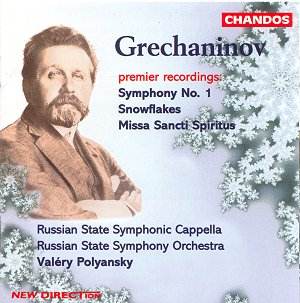
In his First Symphony Grechaninov cannot hide his allegiance to the Russian
nationalist school. It is part and parcel of this symphony. Borodin and
Rimsky-Korsakov (Grechaninov was a Rimsky pupil) peer out from every corner.
Rimsky conducted the premiere in St Petersburg on 26 January 1895. The stunning
melodic flow of Borodin is absent and neither is there the captivating brilliance
of Rimsky. In its place the invention is pleasant, varied and smoothly
accomplished. The style can be likened to early/mid-period Dvorak or Glazunov.
In fact Polyansky and his orchestra are gradually working their way through
the Glazunov symphonies. Polyansky's rather broad tempi for Glazunov are
less in evidence in Grechaninov. Attractive music and a delightful change
but not stunning.
Snowflakes is a charming setting of ten miniature poems of or about childhood.
Kuznetsova is stern of tone with the choir sensitively graduating their dynamics
to match the words. The choral singing is to a very high standard of unanimity
and precision. Thankfully the settings are not childish but weld together
the snowy delight of the singing in Tchaikovsky's Nutcracker with the fantasy
fairytale horrors of Baba Yaga (Liadov) and the icy sunrises of Rachmaninov's
Spring Cantata and Three Russian Songs.
Abandoning the orchestra, the Mass (a product of the New York years) is tactfully
underpinned by the organ. This is a devotional work among Grechaninov's many
such but it has a touch of the Church of England rather than Russian Orthodox.
It has some of the same spirit as the a cappella church music of Ropartz
(Marco Polo) and Koechlin although its surrender to emotion is more ready
than that of the two French masters. This certainly leans more towards
Fauré than to Rachmaninov's Vespers or Chrysostum Liturgy.
The peaceful Agnus Dei is well worth sampling.
There is much to enjoy here and the plangent singing is of the highest order.
The recording is of very high quality and the music is well supported by
full texts and Eric Roseberry's supportive notes.
Rob Barnett

+++++++++++++++++++++++++++++++++++++
Alexander GRECHANINOV
(1864-1956)
Symphony No. 2 Pastoral (1908) 38.11
Mass Et in terra pax (1942) 20.31
 Anatoly Obratzsov (bass)
Anatoly Obratzsov (bass)
Ludmila Golub (organ)
Russian State Symphonic Cappella
Russian State SO/Valeri Polyansky
rec 1995
 CHANDOS CHAN 9486
[58.50]
CHANDOS CHAN 9486
[58.50]
Crotchet
Amazon
UK
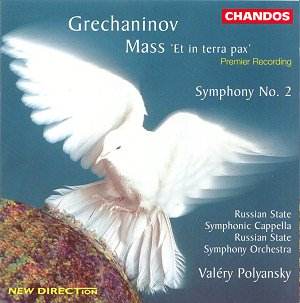
The Second Symphony is a more original and engaging work than the First.
It has claims to compelling qualities not even scratched by the First. In
the second movement at 6.10 the eloquent trumpet tops out a moment of
Tchaikovskian majesty in sympathy with the Fifth Symphony. The tone is
predominantly elegiac-tragic with moments which drift in stimulatingly from
the Pathétique. The clarinet at 8.30 sings poignantly if not as fluently
as we might have hoped. Grechaninov's case is helped by Polyansky's expansive
leanings and by a tremendously clear and meaty recording. Only in the last
movement do the flames flicker and burn low. All in all though anyone drawn
to Tchaikovsky is likely to want this music.
The Mass rather like the Sancti Spiritus mass on CHAN 9397 is for organ and
chorus alone. Its style is in step as well. Older age has distanced him from
the glimmering colours of Russian romantic nationalism and drawn him (without
suffocation) into the Establishment church music of New York. I find little
in this which has the exoticism of Rachmaninov's Vespers. A closer parallel
might be Percy Whitlock or Herbert Sumsion. More C of E than Russian Orthodox.
Less of the censer and more of the hassock. Choirmasters please note as this
music is well worth your attention. Listen to the organ flourish at the Sanctus
and I defy you not to think of Hubert Parry.
A welcome contrast then: a symphony of Tchaikovskian inclination if not rivalling
the master's temperature, and a serious choral work smoothly presented with
almost Elgarian illumination.
Incidentally why is it that this disc and the previous one are labelled as
part of Chandos's 'New Direction' series but that label is missing from the
other discs?
Rob Barnett

+++++++++++++++++++++++++++++++++++++
Alexander GRECHANINOV
(1864-1956)
Symphony No. 3 36.05
Cantata: Kvalite Boga 30.14
 Ludmila Kuznetsova (mezzo)
Ludmila Kuznetsova (mezzo)
Russian State Symphonic Cappella
Russian State SO/Valeri Polyansky
rec 1998
 CHANDOS CHAN 9698
[66.12]
CHANDOS CHAN 9698
[66.12]
Crotchet
Amazon
UK
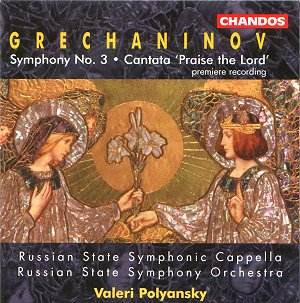
Tchaikovskian blood flowing through the veins warms the flesh of Grechaninov's
Third. The work was premiered in Kiev in 1923, the year before the composer
left for Paris. At 6.20 in the first movement one of those gracious nostalgic
flute melodies of which Glazunov was a pastmaster floats by in eloquent
confidence. The second movement makes equally poignant use of the upper woodwind.
I was reminded somewhat of Madetoja's Second Symphony which also has
Tchaikovskian leanings. The rolling and carolling woodwind of the andante
sounds like a relaxed version of Schumann (Rhenish Symphony) with a dash
of Elgar. Grechaninov writes consistently very well for the woodwind. The
antiphonal effects of the finale are wonderfully unstuffy although the insurgence
at 3.07 of a sub-Rimsky 'rumpus' is not the strongest part of the symphony.
The cantata, in contrast with the smooth 'Establishment' ring of the other
two masses, is a much more clearly Russian work. It is a masterpiece of elation
and exalted peaks. The rapt inwardness of the cries of 'Vruju' from Janacek's
Glagolitic Mass, Vaughan Williams' Magnificat and something
of the singing swing of Paul Paray's St Joan Mass (wonderfully done
by James Paul on Reference) comes across in Grechaninov's work. Time after
time the composer comes up with inspired music. The regal vision and rippling
motion of the final panel of the triptych is a remarkable inspiration with
significant roles for the flute and trumpet. A wonderful discovery.
Once again the recording is crisp and punchy with enough space around the
voices and orchestra to flatter the grand scale of Grechaninov's vision.
Rob Barnett

+++++++++++++++++++++++++++++++++++++
Alexander
GRECHANINOV (1864-1956)
Symphony No. 4 (1927) 34.54
Cello Concerto (1895) 16.53
Missa festiva (1937) 20.28
 Alexander Ivashkin (cello)
Alexander Ivashkin (cello)
Ludmila Golub (organ)
Russian State Symphonic Cappella
Russian State SO/Valeri Polyansky
rec 1996
 CHANDOS CHAN 9559
[74.16]
CHANDOS CHAN 9559
[74.16]
Crotchet
Amazon
UK
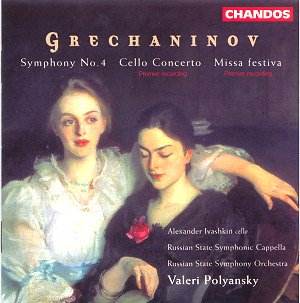
The Fourth Symphony is dedicated to Tchaikovsky and is as consistently Russian
nationalist as its three predecessors. Its Russianness intensified by isolation
from his homeland the work was written in St Jean-de-Luz, in France not far
from the Spanish border. There is a higher quota of angst in the first movement
than we are accustomed to but Grechaninov's mainstream of flowing lyricism
is much in evidence. The Vivo movement dashes and dances with all the swash
of Glazunov's Fifth or the charging chivalry of Miaskovsky's Twenty-First
or Eighteenth Symphonies. The andante marks time going through the Tchaikovskian
motions rather than driven by them. Things improve with the crashing Allegro
vivo - festive and lightly graceful (at 5.01) with a sprinkling of En Saga
along the way.
The Cello Concerto makes for agreeable listening but I must part company
with Alexander Ivashkin when he claims that the work 'is undoubtedly one
of the best piece in the Russian cello repertoire'. The style is romantic,
virtuosic, rhapsodic - closer to Saint-Saens than to Dvorak or to Tchaikovsky's
Rococo Variations.
After the spiced and exalted nationalism of the Cantata coupled with Symphony
No. 3 the Missa Festiva is back in the language of the other two Masses in
this series. Seemingly with this work he trounced thirty-eight French and
Belgian composers taking first prize in a competition. There is no denying
the fluency of his setting and the truly clear and powerful singing reserved
for the choral works in this series. That said these works sing in undenied
beauty of comfortable and unruffled waters. They lack a challenging epic
span.
With the concerto and the mass being pleasant rather than transfixing, our
attention naturally centres on the symphony which is a good work though without
the flare of the second and third symphonies.
Rob Barnett

.
++++++++++++++++++++++++++++++++++
Alexander GRECHANINOV
(1864-1956)
Symphony No. 5 (1936) 37.12
Missa Oecumenica (1936) 42.02
 Tatiana Sharova (sop)
Tatiana Sharova (sop)
Ludmila Kuznetsova (mezzo)
Oleg Dolgov (ten)
Margarita Fadeyev (bass)
Russian State Symphonic Cappella
Russian State SO/Valeri Polyansky
rec 1999 Moscow
 CHANDOS CHAN 9845
[79.16]
CHANDOS CHAN 9845
[79.16]
Crotchet
Amazon
UK
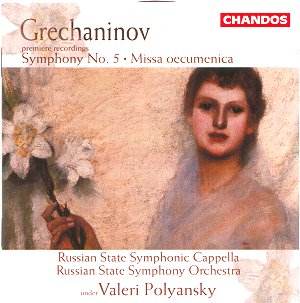
Who would have thought it? An intégrale of Grechaninov's quintet of
symphonies. The cycle is brought to culmination with every Chandos virtue
thumpingly asserted. Polyansky and all the artists are on at least decent
form and the conductor keeps things moving along nicely contrary to his form
in the Glazunov symphony cycle. The choir excels. The recording is big and
bold without being in your lap.
Both works date from the year of Barber's First Symphony, Hovhaness's
Exile Symphony, Uuno Klami's Psalmus, Koechlin's Jungle
Book, Miaskovsky Symphony No. 16, Prokofiev's Eugene Onegin, Rubbra's
First Symphony, Tubin Symphony No. 2, Healey Willan Symphony No. 1 and Vaughan
Williams' Dona Nobis Pacem.
Grechaninov seems never to have been a insurrectionist. He composes with
utmost comfort within the bounds of the Russian nationalistic tradition in
the case of the symphonies but straddles three idioms for the masses and
vocal works. The choral idioms spanned are middle-of-the-road English choral
evensong, a smoothly honeyed echo of the French choral line (Fauré,
Poulenc and Paray) and the Russian Orthodox line.
The Missa Oecumenica is dedicated to the memory of Natalie Koussevitsky
and, promisingly, was written entirely spontaneously. There was no commission
involved. Its premiere was in Boston in 1944 when its message of pan-religious
universality must have had a strong 'charge'. Eric Roseberry notes the imagery
drawn from Russian traditional, Gregorian and Hebrew sources. We know all
too little of Grechaninov's work but this may well be his spiritually most
ambitious conception. The Mass is a work grand span and is determinedly serious.
The opening Kyrie is uplifting in a way familiar from Paray's St
Joan Mass as also is the Sanctus (a good track to sample). After
two hearings there are for me no devastatingly memorable tunes but it leaves
me with that sense of a work of sincerity worth returning to. It is a work
of delicacy and exaltation. Its message of union rather than solipsistic
assertion of identity in isolation and exclusion is timeless. The Agnus Dei
ends without 'Barnum and Bailey' Verdi-isms but with a breathing fall into
silence.
The Symphony is slap bang within the Russian nationalist tradition defined
by Borodin and Rimsky. It was written in Paris. Stokowski (whose breadth
of repertoire is underestimated) premiered it in Philadelphian in 1939. It
must have been reassuring to the conservatively-inclined audiences. It does
not have the inventive tension of Rachmaninov. Without sounding outright
like either composer we can naturally count this symphony as out of the same
stable as the Tchaikovsky symphonies (1-3 with moments from No 5) and the
Glazunov symphonies. Do not look for the turbulence or the unsettling
complexities of Walton's First, Vaughan Williams 4 or Bax 6. The symphony
also has its Beethovenian moments as well as a surprising touch of Rossini
and Weber - in the Andante. That movement is a good one to sample not least
for the brass chorale at 10.14. For a more dynamic spin try the third movement
which has a stamping dance motif of considerable quality with a touch of
the Coronation Walton about it.
The Mass is a strong work and certainly worth hearing again. The symphony
is pleasing but not utterly compelling. A pity that the pause between the
niente end of the Mass and the start of the symphony is momentary.
At 79.16 TT perhaps it was impossible to add more.
Now Chandos s there any chance that you will turn your attentions to another
Russian: Maximilian Steinberg whose four symphonies (1907, 1909, 1929, 1933)
are crying out for a first recording? The Fourth 'Turk-Sib' was broadcast
by the BBC some years ago and the First has been recorded by Neeme Järvi
(DG). He is a most promising composer.
Rob Barnett
 (for the
Mass)
(for the
Mass)
